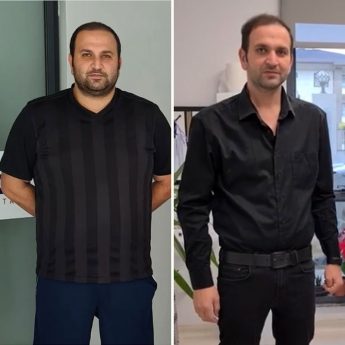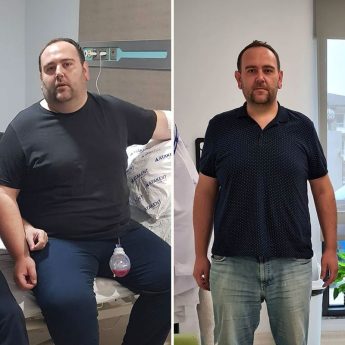Gastric Bypass is divided into 2. These are; RNY Gastric Bypass Surgery and Mini Gastric Bypass Surgery are called. The common purpose of Gastric Bypass surgeries is to shrink the stomach and allow the consumed food to reach the intestines faster.
Thus, two goals are achieved at once. The first goal is to reduce the stomach so that the patient has a feeling of fullness more easily. The second goal, on the other hand, represents the phenomenon of obtaining fewer calories in food by switching nutrients to faster intestinal digestion, which limits weight gain.

In the Mini Gastric Bypass operation, the stomach is divided into two parts. Just like with the RNY Gastric Bypass operation. The difference of Mini Gastric Bypass is that the intestine is connected to the stomach without dividing.
Thus, in the Mini Gastric Bypass operation, one less connection is made in total. On the other hand, which reduces absorption, a longer intestinal section is bypassed in a Mini Gastric Bypass operation compared to an RNY Gastric Bypass operation.
The mini gastric bypass method is considered to be a simple and safe method. It can be easily revised, transformed or vice versa. Thanks to this, it is an increasingly accepted method throughout the world.
How Is It Applied?
In the Mini Gastric Bypass operation; the last part of the stomach is divided into a smaller way between the Decubitus. The stomach is further divided towards the angle of sensation (The angle that prevents reflux between the esophagus and the stomach). The stomach is further divided towards the angle of sensation (The angle that prevents reflux between the esophagus and the stomach)
Then, the pouch formed is anastomosed to the Treitz ligament (The end of the 12-finger intestine), approximately 200 cm away from the jejunum, the part of the 8 small intestine that comes after the 12-finger intestine.
This Effect
Since the stomach is reduced in the Mini Gastric Bypass operation, the obese individual begins to eat smaller portions. And this operation has both limiting and absorption-reducing effects for weight loss. In addition, there are possible hormonal effects that reduce hunger.
In addition to the operation, a nutrition and exercise program is also used. In order not to disturb the shrinking stomach, foods with smaller portions and fewer calories should be eaten. Already, due to the shrinking of the stomach, the individual may feel uncomfortable when large portions are eaten.
Weight Loss
According to research, the average weight loss is as follows;
- 10% of the initial weight at 6 weeks
- 15% of the initial weight in 3 months
- 20 – 25% of the initial weight in 6 months
- 25 – 30% of the initial weight in 9 months
- 35 – 40% of the initial weight can be given in 12 months.
In the first two months after Mini Gastric Bypass, weight is lost very quickly. As long as it is fed in the same way, the patient will continue to lose weight for a long time. At the same time, loss of appetite will continue. However, a situation such as weight gain can also be experienced, albeit a little. In other words, patients with excess carbohydrates and unhealthy diets can gain weight again.
Advantages of Mini Gastric Bypass
- Since the part is not removed from the stomach, it can be restored again.
- Technically, RNY is easier to perform than Gastric Bypass operation.
- It creates more permanent solutions to type 2 diabetes and other related diseases.
- There is no liquid feeding period after the operation.
- The absorption rate is lower.
- The probability of weight gain again is lower compared to other stomach operations.
Disadvantages of Mini Gastric Bypass
- There is a particularly high probability of bile reflux.
- It should not be preferred in patients with reflux.
- Stomach ulcers and esophageal irritation (esophagitis) are more common due to reflux.
- And it is absolutely necessary to take vitamins for life.
Complications That May Occur
Complications that may occur in the short term;
- Risk of leakage
- Risk of bleeding
- Respiratory tract infection
- Embolism
- Incision site hernia
- Wound infection
The complications that may occur in the long term are as follows;
- Stomach ulcer
- Bile reflux
- Gallstones
- Incision site hernia
- Intestinal obstruction
What Should Those Who Have Gastric Bypass Pay Attention to?
First of all, it should definitely be worked with a specialist dietitian. There are some conditions that individuals with Mini Gastric Bypass surgery should pay attention to.
The nutrition program should be organized as 3 main meals and 3 Decadal meals. In addition, only fruits should be focused on Decoupage meals. At the same time, this program should be free of fat, sugar and all kinds of carbonated foods and drinks. For example, there should be a low-carb and high-protein diet program.
Proper nutrition is also essential to prevent vitamin and mineral deficiencies that may occur. The consumption rate of solid foods should be reduced. Caffeine, salt consumption should also be minimized. The habit of chewing food abundantly should be acquired.
In addition, water consumption should increase to 2.5 liters and above in the normal process. But immediately after the operation, these proportions are not suitable. Gradually, it can be progressed as 1 liter in the first week, 1.5 liters in the next week, and 2.5 liters in the following periods.























